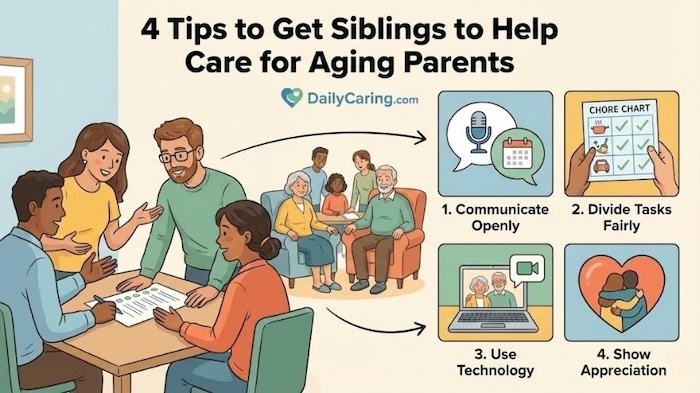Navigating caregiving responsibilities with siblings can often feel like walking through a relational minefield, where old rivalries and new resentments threaten to derail even the best intentions. What should be a team effort can quickly become a source of significant stress, leaving you feeling unsupported and alone in your responsibilities.

But it doesn't have to be this way. By shifting your approach from confrontation to collaboration, you can transform this challenge into an opportunity to strengthen your family bonds. These three essential tips will help you and your siblings build a more united, supportive, and effective caregiving team for your parents.
Caring for Parents May Cause Resentment Among Siblings
Caring for aging parents can get more complicated when siblings need to work together.
These emotionally-charged situations tend to bring out conflicts and old family issues.
We found a helpful article from Family Caregiver Alliance that helps resolve common issues that come up when caregiving with siblings.
Here, we share insights about three key points from the article:
- Understanding what causes sibling tension
- Rebalancing caregiving responsibilities when one person has been doing all the work
- Handling disagreements about how much help your parents need
3 Tips for Siblings Who Begin Caregiving for a Parent or Loved One
1. Why sibling tensions can erupt as parents need care
Uncertainty can cause conflict, and there’s no how-to manual to guide you through caring for your parents as a team.
It’s also an emotional time as you watch your parents decline. Everyone has different ways of coping with their parents’ aging – anger, fear, sadness, denial.
On top of all that, old feelings and arguments are resurfacing.
Childhood competition may start again over the need for love, approval, or to be seen as essential or competent.
These struggles are likely to show up in arguments over who does or doesn't do something, how much each person does, and who’s in charge.
2. Carefully consider caregiving responsibilities as a family
Families often don't think about or discuss in advance who will be the primary caregiver and how other family members will help.
A common situation is for the sibling who lives near the parents to start helping with small things.
Then, a year later, they realize they’re now spending 50+ hours a week caregiving and feeling angry that the other siblings aren’t doing their share.
It's natural for families to fall into that trap or to make common assumptions like:
- The son will handle the finances, and the daughter will take care of the emotional and physical needs.
- One sibling should be Mom's caregiver because they don’t have a job, or they need a place to stay.
- The sibling without children should take care of everything.
The problem is that these assumptions don’t distribute the work fairly or account for individual capabilities.
Families need to hold a meeting to discuss and agree on the tasks each person will be expected to perform, whether anyone will be compensated for their work, and how those payments will be structured.
If the caregiving responsibilities are already out of balance, decide together on how to ease the burden for the primary caregiver.
And if there’s too much conflict among siblings, consider having a neutral, unbiased person facilitate the meeting.
3. Siblings may have different ideas about what parents need
Siblings deal with their parents’ decline in different ways.
Some need their parents to always act like parents, while others become overprotective, hoping to prevent anything bad from happening. Some, however, cannot accept the fact that their parents need help.
How to handle these differences:
- If possible, give siblings time to understand what’s happening and come to a gradual agreement on how much care is really needed.
- Keep all siblings up to date about your parents’ condition so everyone has the facts. That means sharing reports and info from doctors, geriatric care managers, or social workers.
- Remember that parents may tell each child different things about their health. Work together and pool your info so you all have a more complete picture.
Final Thoughts
Remember, managing caregiving with siblings isn't about achieving perfect equality in every task, but about fostering mutual respect and shared commitment.
By focusing on clear communication, defined roles, and shared decision-making, you can prevent conflicts from festering and build a stronger support system for everyone involved—most importantly, for your aging parents.
This collaborative approach not only lightens the practical load but can also become a profound chapter of connection and purpose for your entire family.
Recommended for you:
- 4 Ways to Get Family to Help with Aging Parents
- Dealing with Aging Parents and Siblings: 5 Ways to Work Better Together
- Caregiver Family Meetings: 5 Keys to Success
About the Author

Connie is the founder of DailyCaring.com and was a hands-on caregiver for her grandmother for 20 years. (Grandma made it to 101 years old!) She knows how challenging, overwhelming, and all-consuming caring for an older adult can be. She also understands the importance of support, especially in the form of practical solutions, valuable resources, and self-care tips.














We used an online site called MEALTRAIN to keep a current schedule and caregiving notes. It also has a calendar for signing up for caregiving shifts or meals. It was an important tool for our family of 15 kids. Out-of-state/town siblings could easily stay current with all things mom, as well as sign up for respite care visits when they were in town.
Thanks for sharing this resource and your experience!